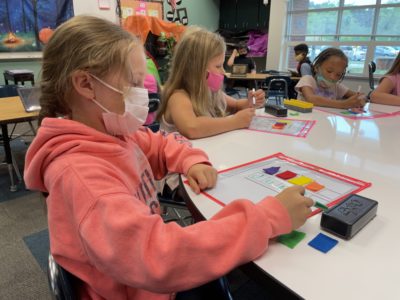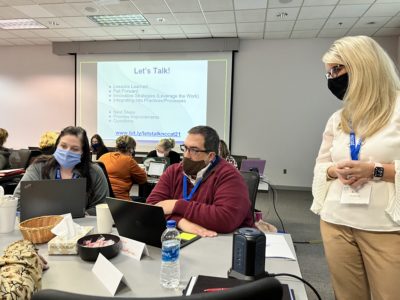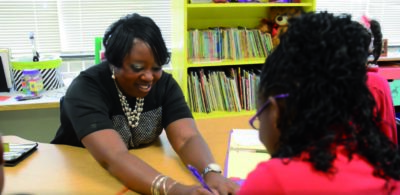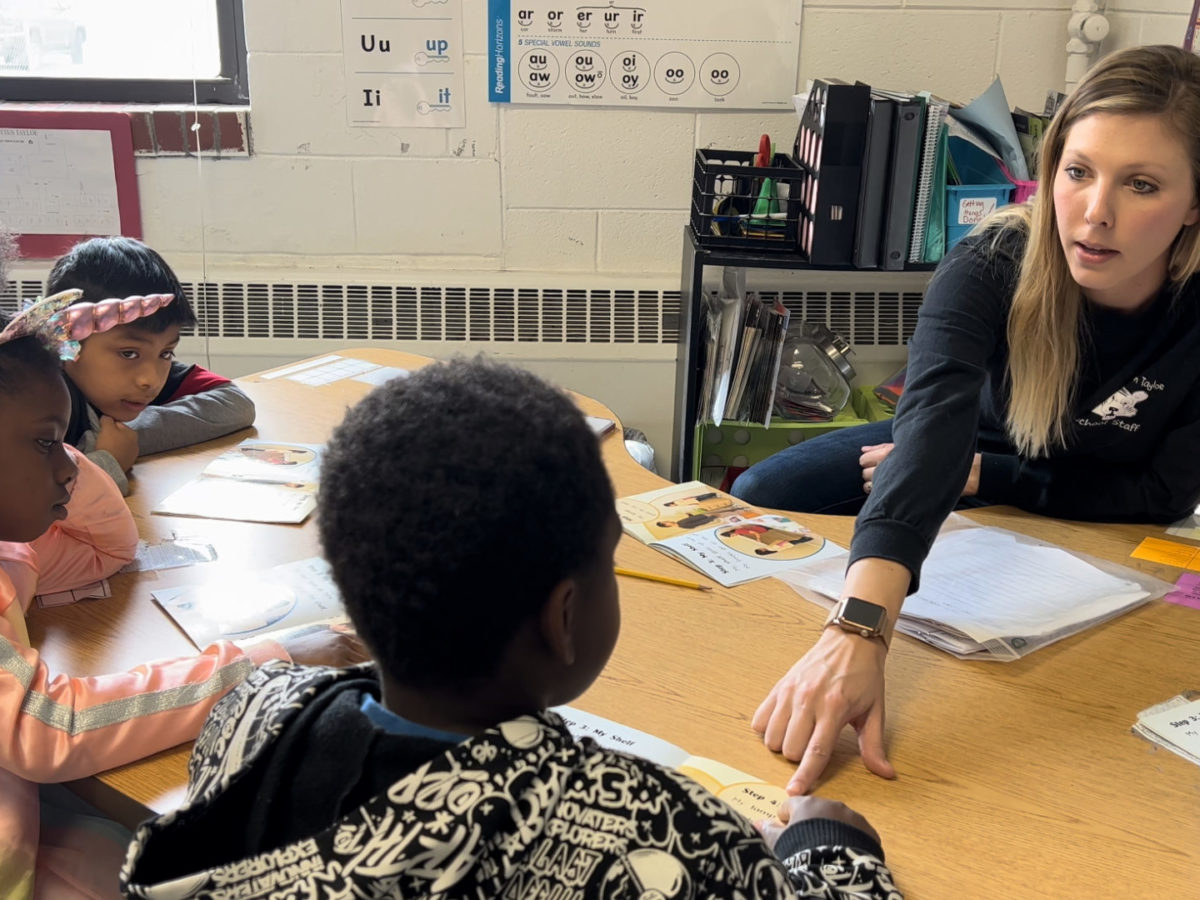
The following piece combines the executive summary and introduction of “Meeting the Moment: Strategic Recommendations for Literacy & Equity in North Carolina,” a brief from the Friday Institute for Educational Innovation at NC State University. Click here for the full report.
In the last decade, North Carolina has made significant efforts to support student literacy growth. Despite these efforts, student reading scores continue to demand our collective attention and innovation. According to the 2019 National Assessment of Educational Progress, 64% of fourth graders and 67% of eighth graders in North Carolina scored below proficiency level in reading. The COVID-19 pandemic has exacerbated longstanding inequities and made the already complex work of teaching reading even more challenging.
“Meeting the Moment: Strategic Recommendations for Literacy & Equity in North Carolina,” extends the work of the 2022 NC PreK-12 Literacy & Equity Summit. It draws from a statewide educator questionnaire and focus group data to put forward six recommendations:
- Establish system-level supports to sustain instructional improvements in reading.
- Optimize the state’s investment in PreK5 literacy learning to meet 6-12 student reading needs.
- Deepen investments in PreK literacy.
- Coordinate reading diagnostic and intervention resources for 6-12 students and teachers in Multi-Tiered System of Supports (MTSS).
- Nurture the Literacy Learning Ecosystem via innovative collaborations and communication.
- Champion families and caregivers within the Literacy Learning Ecosystem.
As a social practice, literacy cannot be taught or learned in a vacuum. Preparing competent, lifelong readers in North Carolina necessitates a vibrant Literacy Learning Ecosystem. North Carolina’s Literacy Learning Ecosystem includes schools and school personnel (e.g., classroom teachers, specialists, instructional coaches, administrators); pre- and in-service educator learning (e.g., institutions of higher education, alternative pathways to practice, professional development); local, state and federal policymakers; communities and nonprofits (e.g., public libraries, museums, community organizations, philanthropic foundations); and families and caregivers. These six recommendations share possibilities for strengthening the Literacy Learning Ecosystem within our state.
The collective well-being of North Carolinians is intricately tied to equitable access and opportunities, as well as equitable funding for education. Longstanding disparate opportunities for historically marginalized groups and current workforce challenges compel us to examine the interconnections between literacy and equity. Literacy not only serves as the basis for school success, workforce opportunities and participation in civic life, but it also contributes to our humanity.
North Carolina’s Literacy Learning Challenges
Although literacy encompasses a broad array of skills related to reading, writing and language, one of the most prominent policy-relevant indicators of literacy development in school contexts is students’ performance on reading assessments like the North Carolina End-of-Grade (EOG) reading test administered each year beginning in grade 3. Research shows that students’ scores on these types of assessments depend on a number of competencies. These competencies include phonological awareness, decoding/phonics, fluency, oral language and early reading comprehension skills that enable children to begin extracting and constructing meaning from written language.
Learners and educators across North Carolina are living, teaching and learning in uncertain times. The North Carolina 2019 National Assessment of Educational Progress (NAEP) data indicate that our state is underperforming in 4th and 8th grade reading (64% and 67% below proficiency, respectively). Reading scores tend to be even lower for students who are eligible for free and reduced lunch and students of color.
COVID-19 resulted in unprecedented disruptions in literacy learning. A 2022 analysis by the Office of Learning Recovery at the North Carolina Department of Public Instruction (NC DPI) indicates that North Carolina student learning trajectories were negatively impacted as compared to their pre-pandemic expected performances. This includes student performance on reading assessments for grades 3-8.
To address the impact on learning resulting from COVID-19 and pandemic-related traumas, North Carolina must coordinate equitable and more just educational policies and instructional practices. Relatedly, North Carolina’s 150,000 teachers need and deserve access to the very best professional development and systemic supports to enable best practices in reading instruction.
North Carolina’s 1.4 million students need and deserve high quality reading instruction so that they can flourish in an ever-changing, interdependent world.
North Carolina’s Investments in Literacy Learning
Over the past decade, North Carolina has worked hard to address our state’s PreK-12 reading challenges. However, policies like Read to Achieve have not yielded optimal student reading outcomes. In 2018, the Friday Institute for Educational Innovation published “Is Read to Achieve Making the Grade?,” an analysis of the 2012 Read to Achieve Act. A key finding was that policy implementation lacked consistency and coherence across North Carolina school districts. The Excellent Public Schools Act, which amends Read to Achieve, puts front and center coordinated supports for reading excellence, and specifically the science of reading, in North Carolina.
The science of reading is defined in the North Carolina General Statute on Elementary and Secondary Education 115C-83.3 as “evidence-based reading instruction practices that address the acquisition of language, phonological and phonemic awareness, phonics and spelling, fluency, vocabulary, oral language, and comprehension that can be differentiated to meet the needs of individual students.”
EPSA addresses supporting students’ reading progress through the science of reading for both pre-service and inservice teacher education. North Carolina educator preparation programs (EPPs) have been directed to include adequate coursework in the science of reading for elementary education teachers. This directive is shepherded by the UNC System Literacy Fellows who have created a “Comprehensive Literacy Framework,” with implementation guidance for UNC System EPPs to ensure that pre-service teachers “know and can demonstrate the essential components of literacy instruction.” The framework sets forth eight interrelated and essential literacy instruction components: concepts of print; language; phonological and phonemic awareness; phonics, orthography and automatic word recognition; fluency; vocabulary; reading comprehension; and writing.
For in-service teachers, EPSA requires ongoing professional development grounded in the scientific reading research. To begin, NC DPI is utilizing a third-party independent teacher training program to deliver this professional development. The COVID-19 Response and Relief Act further specified the vendor with whom NC DPI must contract to fulfill this stipulation. That vendor, Voyager Sopris Learning, Inc. (with Lexia Learning), is providing Language Essentials for Teachers of Reading and Spelling (LETRS®) training for PreK-5 educators and administrators via a cohort model across the state by 2024. This training is a significant investment in PreK-5 educators and learners.
North Carolina’s Literacy Learning Ecosystem
Literacy is a social practice and cannot be taught or learned in a vacuum. It requires a vibrant Literacy Learning Ecosystem. North Carolina’s Literacy Learning Ecosystem includes schools and school personnel (e.g., classroom teachers, specialists, instructional coaches, administrators); pre- and in-service educator learning (e.g., institutions of higher education, alternative pathways to practice, professional development); local, state and federal policymakers; communities and nonprofits (e.g., public libraries, museums, community organizations, philanthropic foundations); and families and caregivers.
Figure 1. Literacy Learning Ecosystem
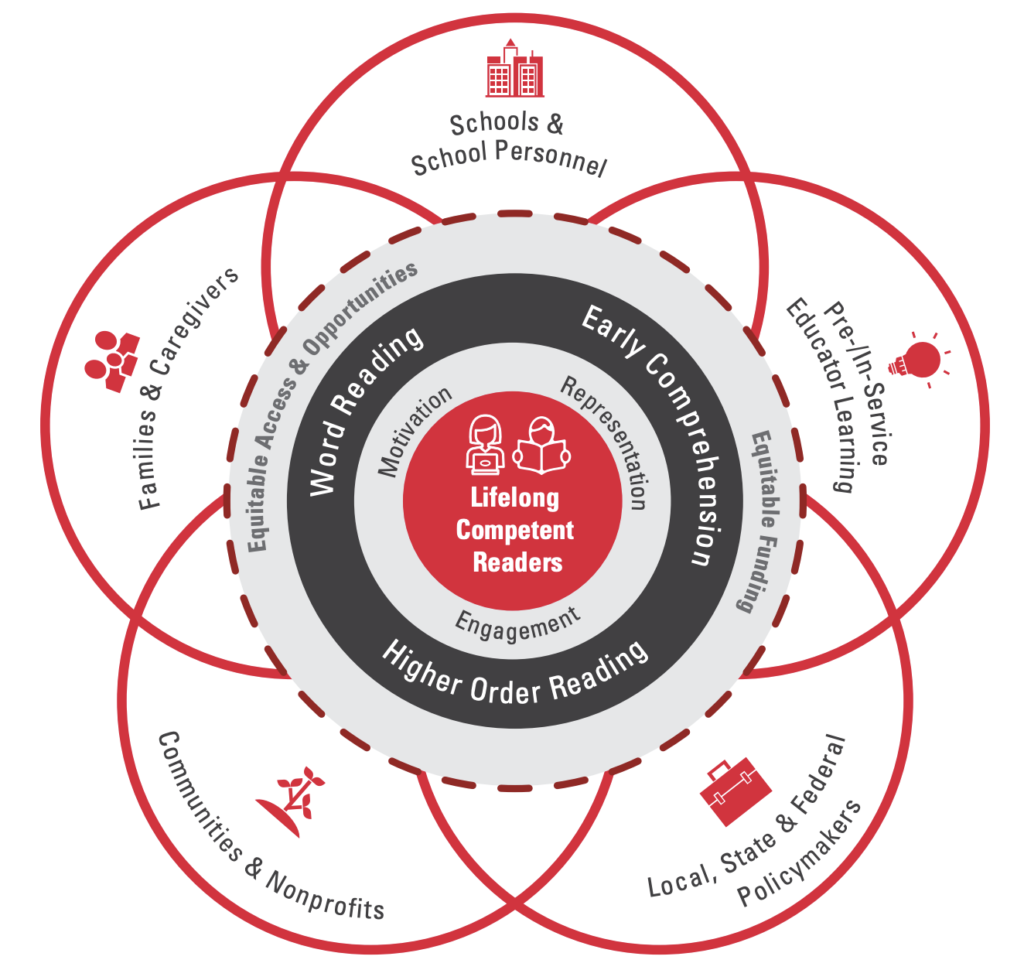
At its best, the Literacy Learning Ecosystem generates open lines of strategic communication and aligned, complementary supports toward students’ word reading, early comprehension and higher order reading growth.
North Carolina’s Opportunity to Strengthen the Literacy Learning Ecosystem
Over the span of three school years (2019-2022), North Carolina educators have grappled with compounded professional challenges. They learned to teach online; worked to implement Multi-Tiered System of Supports (MTSS) as a mechanism to differentiate instruction; engaged in a fundamental shift in reading instruction; and responded to national and local calls for racial equity while simultaneously navigating political tensions. Teaching has always been complex, but this moment in our history is unprecedented.
Demonstrating their enduring commitment to supporting lifelong readers, 834 educators and stakeholders from across North Carolina convened virtually on January 19, 2022, at the inaugural NC PreK-12 Literacy & Equity Summit. The Summit was hosted by the Friday Institute and organized with NC DPI, EducationNC, the UNC System Literacy Fellows and NC Department of Health and Human Services (DHHS). The discussions from the Summit, as well as the corresponding questionnaire and focus groups, provided the basis for this brief.
“Meeting the Moment: Strategic Recommendations for Literacy & Equity in North Carolina,” presents recommendations based on teacher perspectives and experiences. The voices of the people closest to the on-the-ground work, in this case educators, are essential to policy recommendations. As evident in the findings presented in this brief, North Carolina educators are passionate about their students, understand the urgency of student literacy needs and innovate daily despite existing and new professional challenges. In the words of a North Carolina National Board Certified elementary teacher and reading specialist:
“From the top down, from the county office all the way to the classroom, everyone wants the children to succeed. We want to see them reading. We want them to be successful. We need to focus on things that we can do to help the teachers help the children.”
Recommended reading
